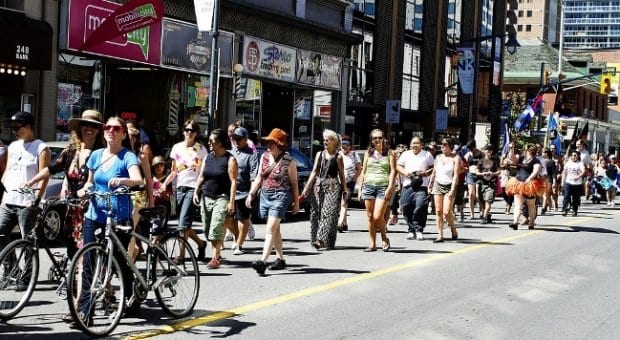Ottawa’s lesbians and their allies gathered Aug 24 for Capital Pride’s annual Dyke March with the aim of paying tribute to the past, present and future of the queer women’s community.
Time of Your Life was the theme of this year’s march, which began with a rally at the Canadian Tribute to Human Rights monument before the contingent marched through the Village to Minto Park for a social afternoon.
It’s important for older dykes to march, says Marie Robertson, who participated in the 1971 We Demand rally on Parliament Hill.
Robertson, now a member of the Ottawa Senior Pride Network, says younger women need to see positive, older role models.
Robertson says the community should be vigilant, especially with the Conservative government in power.
“Whether it’s gay rights or women’s rights, we could so easily lose what we fought so hard to gain,” she says. “It’s important for us to be cognizant of that.”
Sarah Manns, who sits on the organizing committee for the Dyke March, says women still need to break through the glass ceiling and contend with wage inequality.
“We still live in a society that is ruled by patriarchy,” Manns says of why a march for women, separate from the Pride parade, remains vital. “I don’t think the queer community is free of those biases and prejudices. We just want to make sure that women have a space within Pride that’s specific to women, for women, by women. It’s a valuable component to the Pride weekend.”
Bonnie McDougall, who represented the “past,” spoke of how far the community has come since she first demonstrated for equal rights.
McDougall recalled a boat cruise that followed a demonstration in Provincetown in the late 1960s, where gays and lesbians became the target of bigots wielding tomatoes and eggs.
“We worked hard, we have come to this place, we are extremely proud of how far we have come — but we all know that we’ve still got a lot of work to do,” she says. “And it looks to me that this is just the kind of crowd to do it. You look capable of taking us further, and that’s what we need to do.”
B Wilder, who represented the “present,” and trans Youth Services Bureau volunteer Rebel, who represented the “future,” followed McDougall onstage.
Rebel said that coming out to her father was the hardest thing she ever had to do and thanked women who came before her for paving the way.
“I would not be up here today, I would not have the strength to be out in the community, if it wasn’t for people like them,” Rebel said. “And people like you who spend your time, your strength, your voices, trying to get respect, trying to show that we are everyday people and we are good people who deserve the right to share the world with everybody else.”
March attendee Jazz took part in her wheelchair; she says it’s the community’s acceptance that resonates with her.
“We are who we are, and there is nothing we can do to change,” she says. “With dykes, it’s not about being one or the other. You can be both, you can be gay, you can be lesbian, you can be bigender, you can be anything — it’s all acceptable with us.”
Jayda Kelsall took part in the march on her brightly decorated bicycle to “show support and feel the love of the Dyke March.” She says gays and lesbians still need to push for complete equality.
“That’s why we do this,” Kelsall says. “This is why we march and why we have Pride.”
View more of Zara Ansar’s Dyke March photos.


 Why you can trust Xtra
Why you can trust Xtra


